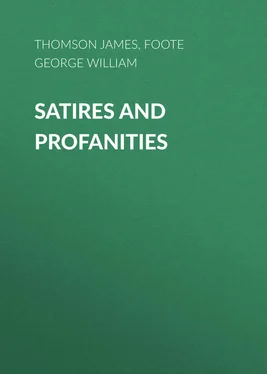George Foote - Satires and Profanities
Здесь есть возможность читать онлайн «George Foote - Satires and Profanities» — ознакомительный отрывок электронной книги совершенно бесплатно, а после прочтения отрывка купить полную версию. В некоторых случаях можно слушать аудио, скачать через торрент в формате fb2 и присутствует краткое содержание. Жанр: foreign_religion, foreign_antique, foreign_prose, на английском языке. Описание произведения, (предисловие) а так же отзывы посетителей доступны на портале библиотеки ЛибКат.
- Название:Satires and Profanities
- Автор:
- Жанр:
- Год:неизвестен
- ISBN:нет данных
- Рейтинг книги:4 / 5. Голосов: 1
-
Избранное:Добавить в избранное
- Отзывы:
-
Ваша оценка:
- 80
- 1
- 2
- 3
- 4
- 5
Satires and Profanities: краткое содержание, описание и аннотация
Предлагаем к чтению аннотацию, описание, краткое содержание или предисловие (зависит от того, что написал сам автор книги «Satires and Profanities»). Если вы не нашли необходимую информацию о книге — напишите в комментариях, мы постараемся отыскать её.
Satires and Profanities — читать онлайн ознакомительный отрывок
Ниже представлен текст книги, разбитый по страницам. Система сохранения места последней прочитанной страницы, позволяет с удобством читать онлайн бесплатно книгу «Satires and Profanities», без необходимости каждый раз заново искать на чём Вы остановились. Поставьте закладку, и сможете в любой момент перейти на страницу, на которой закончили чтение.
Интервал:
Закладка:
RELIGION IN THE ROCKY MOUNTAINS
Top of Pike’s Peak, March 4th, 1873.
Honored with your special commission, I at once hurried across to Denver, and thence still westward until I found myself among the big vertebrae of this longish backbone of America. I have wandered to and fro among the new cities, the advanced camps of civilisation, always carefully reticent as to my mission, always carefully inquiring into the state of religion both in doctrine and practice. You were so hopeful that high Freethought would be found revelling triumphant in these high free regions, that I fear you will be acutely pained by this my true report. Churches and chapels of all kinds abound – Episcopalian, Methodist Episcopal (for the Methodists here have bishops), Presbyterian, Baptist, Congregational, Roman Catholic, etc. Zeal inflaming my courage, three and even four times have I ventured into a church, each time enduring the whole service; and if I have not ventured oftener, certainly I had more than sufficient cause to abstain. For as I suffered in my few visits to churches in your England, so I suffered here; and such sufferings are too dreadful to be frequently encountered, even by the bravest of the brave. Whether my sensations in church are similar to those of others, or are peculiar to myself, I cannot be sure; but I am quite sure that they are excruciating. On first entering I may feel calm, wakeful, sane, and not uncomfortable, except that here I rather regret being shut in from the pure air and splendid sky, and in England rather regret having come out through the raw, damp murk, and in both regret that civilisation has not yet established smoking-pews; but the Church is always behind the age. It is pleasant for awhile to note the well-dressed people seated or entering; the men with unctuous hair and somewhat wooden decorum; the women floating more at ease, suavely conscious of their fine inward and outward adornments. It is pleasant to keep a hopeful look-out for some one of more than common beauty or grace, and to watch such a one if discovered. As the service begins, and the old, old words and phrases come floating around me, I am lulled into quaint dream-memories of childhood; the long unthought-of school-mates, the surreptitious sweetstuff, the manifold tricks and smothered laughter, by whose aid (together with total inattention to the service, except to mark and learn the text) one managed to survive the ordeal. The singing also is pleasant, and lulls me into vaguer dreams. Gradually, as the service proceeds, I become more drowsy; my small faculties are drugged into quiet slumber, they feel themselves off duty, there is nothing for which they need keep awake. But, with the commencement of the sermon, new and alarming symptoms arise within me, growing ever worse and worse until the close. Pleasure departs with tranquility, the irritation of revolt and passive helplessness is acute. I cannot find relief in toffy, or in fun with my neighbors, as when I was a happy child. The old stereotyped phrases, the immemorial platitudes, the often-killed sophistries that never die, come buzzing and droning about me like a sluggish swarm of wasps, whose slow deliberate stinging is more hard to bear than the quick keen stinging of anger. Then the wasps, penetrating through my ears, swarm inside me; there is a horrid buzzing in my brain, a portentous humming in my breast; my small faculties are speedily routed, and disperse in blind anguish, the implacable wasps droning out and away after them, and I am left void, void; with hollow skull, empty heart, and a mortal sinking of stomach; my whole being is but a thin shell charged with vacuity and desperate craving; I expect every instant to collapse or explode. It is but too certain that if anyone should then come to lead me off to an asylum for idiots, or a Young Men’s Christian Association, or any similar institution, I could not utter a single rational word to save myself. And though all my faculties have left me, I cannot attempt to leave the church; decorum, rigid and frigid, freezes me to my seat; I stare stonily in unimaginable torture, feebly wondering whether the sermon will outlast my sanity, or my sanity outlast the sermon. When at length released, I am so utterly demoralised that I can but smoke furiously, pour much beer and cram much dinner into my hollowness, and so with swinish dozing hope to feel better by tea-time. Now, though in order to fulfil the great duties you entrust to me, I have cheerfully dared the Atlantic, and spent long days and perilous nights in railroad cars, and would of course (were it indeed necessary) face unappalled mere physical death and destruction, I really could not go on risking, with the certainty of ere long losing, my whole small stock of brains; especially as the loss of these would probably rather hinder than further the performance of the said duties. For suppose me reduced to permanent idiocy by church-going, become a mere brazen hollowness with a riotous tongue like Cowper’s church-going bell; is it not most likely that I would then turn true believer, renouncing and denouncing your noble commission, even as you would renounce and denounce your imbecile commissioner?
Finding that I could not pursue my inquiries in the churches and chapels, I was much grieved and perplexed, until one of those thoughts occurred to me which are always welcome and persuasive, because in exact agreement with our own desires or necessities. I thought of what I had remarked when visiting your England: how the churches and chapels and lecture-halls, each sect thundering more or less terribly against all the others, made one guess that the people were more disputatious than pious; how one became convinced, in spite of his infidel reluctance, that the people were indeed, as a rule, thoroughly and genuinely religious, by mingling freely with them in their common daily and nightly life. I asked myself, What really proved to me the pervading Christianity of England? the sermons, the tracts, the clerical lectures, the missionary meetings? the cathedrals and other theatres and music-halls crowded with worshippers on Sunday, while the museums and other public-houses were empty and shut? No, scarcely these things; but the grand princeliness of the princes, the true nobleness of the nobles, the lowliness of the bishops, the sanctity of the clergy, the honesty of the merchants, the veracity of the shopkeepers, the sobriety and thrift of the artisans, the independence and intelligence of the rustics; the general faith and hope and love which brightened the sunless days, the general temperance and chastity which made beautiful the sombre nights; the almost universal abhorrence of the world, the flesh, and the Devil; the almost universal devotion to heaven, the spirit, and God.
I thereupon determined to study the religion out here, even as I had studied it in England, in the ordinary public and private life of the people; and you will doubtless be sorely afflicted to learn that I have found everywhere much the same signs of genuine, practical Christianity as are so common and patent in the old country. The ranchmen have sown the good seed, and shall reap the harvest of heavenly felicity; the stockmen will surely be corraled with the sheep, and not among the goats, at the last day; not to gain the whole world would the storekeepers lose their own souls; the pioneers have found the narrow way which leadeth unto life; the fishermen are true disciples, the trappers catch Satan in his own snares, the hunters are mighty before the Lord; bright are the celestial prospects of the prospectors, ana the miners are all stoping-out that hidden treasure which is richer than silver and much fine gold. As compared with the English, these Western men are perchance inferior in two important points of Christian sentiment: they probably do not fear God, being little given to fear anyone; they certainly do not honor the king, perhaps because they unfortunately have none to honor. On the other hand, as I have been assured by many persons from the States and the old country, they are even superior to the English in one important point of Christian conduct. Christ has promised that in discharging the damned to hell at the day of judgment, he will fling at them this among other reproaches, “I was a stranger, and ye took me not in,” and this particular rebuke seems to have wrought a peculiarly deep impression in these men, perhaps because they have much more to do with strangers than have people in old settled countries, so much, indeed, that the word “stranger” is continually in their mouths. The result is (as the said persons from England and the States have often solemnly assured me) that any and every stranger arriving in these regions is most thoroughly, most beautifully, most religiously taken in. So that should any of these fine fellows by evil hap be among the accursed multitude whom Christ thus addresses, they will undoubtedly retort in their frank fashion of speech: “Wall, boss, it may be right to give us hell on other counts, but you say you was a stranger and we didn’t take you in. What we want to know is, Did you ever come to our parts to trade in mines or stock or sich? If you didn’t , how the Devil could we take you in? if you did , it’s a darned lie, and an insult to our understanding to say we didn’t .”
Читать дальшеИнтервал:
Закладка:
Похожие книги на «Satires and Profanities»
Представляем Вашему вниманию похожие книги на «Satires and Profanities» списком для выбора. Мы отобрали схожую по названию и смыслу литературу в надежде предоставить читателям больше вариантов отыскать новые, интересные, ещё непрочитанные произведения.
Обсуждение, отзывы о книге «Satires and Profanities» и просто собственные мнения читателей. Оставьте ваши комментарии, напишите, что Вы думаете о произведении, его смысле или главных героях. Укажите что конкретно понравилось, а что нет, и почему Вы так считаете.












